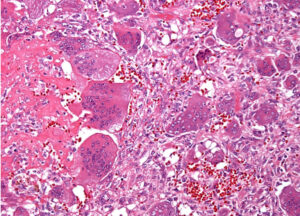
Bone biology and disease research is focused on defining the signals and mechanisms important for bone formation and bone resorption in both normal and pathological situations.
While osteoblasts differentiate and localize to form new bone at sites where osteoclastic bone resorption has occurred, the signals responsible for this coupling effect are largely unknown and are a focus of our program. Another major research area in this program is centered on the pathophysiology of bone destruction in primary and metastatic bone cancer as well as bone infections. We have also made major advances in understanding how the activity of these cells impacts the development and progression of disease.
Our rare bone disease program investigates the mechanisms of bone formation and mineral metabolism during normal skeletal growth and disease. A major emphasis of this program is geared toward the development and use of animal models to uncover the pathologic processes associated with rare bone diseases, including osteogenesis imperfecta, Down syndrome, and most recently, hypophosphatasia (HPP).
Our strategy combines cutting-edge laboratory research with state-of-the-art gene editing to discover the mechanisms that result in better treatments for people affected by all types of bone disease.
